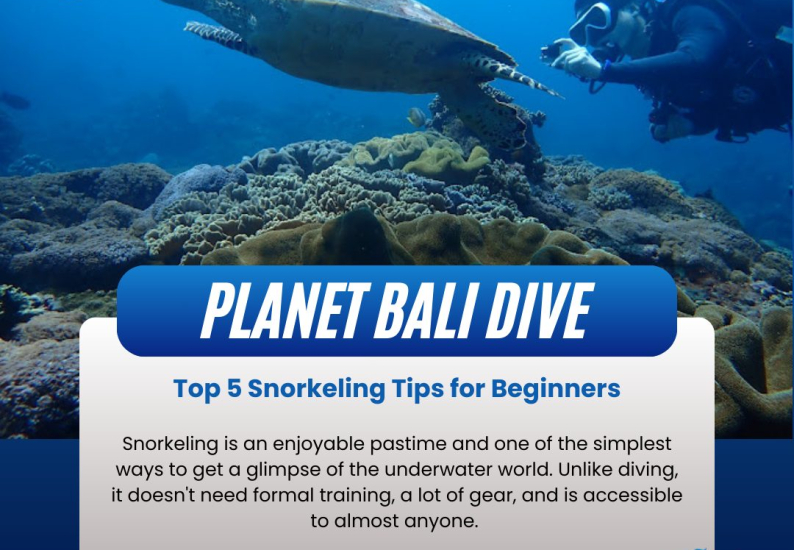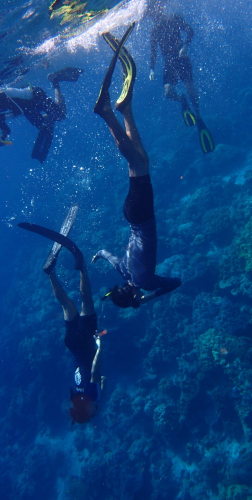Snorkeling is an enjoyable pastime and one of the simplest ways to get a glimpse of the underwater world. Unlike diving, it doesn’t need formal training, a lot of gear, and is accessible to almost anyone. However, many people have bad first-time snorkeling experiences.
Nervousness, a mask that leaks or fogs up, uncomfortable fins, and water getting into your snorkel can all make the experience unpleasant or even risky. So here are some tips to help you steer clear of the most common mistakes beginners make and fully enjoy snorkeling.
Table of Contents
Toggle1. Get Equipment That Fits
Having ill-fitting gear can lead to various problems. Therefore, when hiring equipment, it is advisable to try it on and inspect its condition before heading out to the open ocean.
If you anticipate doing a lot of snorkeling on a specific trip, consider purchasing your own equipment so that you can select what suits you best and always be aware of the gear’s condition. A simple way to test the fit of the mask is to place it against your face (without using the strap), gently suck through your nose, and then release the mask. If it forms a good seal, it will adhere to your face for a few seconds.
Avoid sucking too hard, as this will distort the skirt and create a false seal. A properly fitting mask will seal with a gentle touch. Then, wear the mask with the strap behind your head and assess how it feels.
Move your facial muscles and check the strap release system. When it comes to fins, they should fit snugly without causing discomfort to your feet. Fins that are too loose are likely to cause chafing, painful blisters, or even come off in the water.
Begin by selecting fin size based on your shoe size. Try on the fins and perform the shake test.
Sit down and shake your foot in all directions. The fin should feel secure without any rubbing or pinching. If it feels too tight with no movement at all, try the next size up.
If there is a lot of movement when you shake your foot, go down a size and start over. If you find yourself in between sizes, consider wearing neoprene or lycra socks under your fins for added padding and to prevent uncomfortable rubbing.
Book Diving Manta
2. Learn Basic Mask and Snorkel Skillsc
Breathing through the snorkel may feel strange at first, so it’s suggested that you put on your equipment and swim around in a pool to get used to it. If you are at the beach, start by swimming in the shallow water before going into deeper areas.
It’s also important to practice clearing water from your snorkel and mask. Being comfortable with these skills will help you stay calm if your mask or snorkel get flooded in deeper water.
Clearing your snorkel is quite easy. Simply blow firmly through the snorkel to push the water out of the top. If your snorkel has a purge valve, water will also come out through the valve below the mouthpiece.
Another method, called the displacement clear, can be used if you want to dive down and have a snorkel without a purge valve. The displacement clear starts while you are still underwater. As you begin to surface, look straight up and exhale a small amount of air into the snorkel.
As you ascend, the air will expand and push the water out. By the time you reach the surface, most or all of the water will be cleared from the snorkel. Another important skill to learn is how to clear water from your mask.
You can always surface to do this, but if you’ve spotted something amazing and don’t want to lose sight of it, you’ll need to quickly clear your mask underwater. First, inhale through your snorkel for a full breath of air.
Then press the top of your mask against your forehead with your palm or fingers to create a tight seal on top, allowing you to expel the water from the bottom of your mask. Finally, exhale through your nose to force the water out.
It’s also important to learn how to defog your mask. Here are some tips that can help prevent fogging:
- Clean your mask with toothpaste and a toothbrush or with dish soap and a soft brush or washcloth.
- Use anti-fog every time you snorkel by making a mild solution of baby shampoo and water or buying a special anti-fog product.
- If your mask fogs up while you’re in the water, remove it, spit in it, shake it around to coat the glass, then rinse it briefly and put it back on.
- Avoid exhaling through your nose as this can cause fogging on the lens. By practicing these skills and taking care of your equipment, you can have an enjoyable and comfortable snorkeling experience.
3. Choose a Good Location
Conduct some research to locate a suitable snorkeling location for beginners. Ideally, it should be a spot with tranquil waters, abundant marine life, and minimal crowds. Avoid attempting to snorkel in areas with strong currents or waves, as they will increase the difficulty of navigating and using your equipment.
Waves also reduce underwater visibility, so it is preferable to snorkel in calm waters. Starting from the beach rather than jumping from a boat is also recommended, as it allows for a gradual swim to a comfortable depth.
Lastly, choose a location with vibrant fish and coral to observe. Selecting a dull or lifeless spot for your first experience may lead you to question the appeal of snorkeling.
4. Stay Relaxed and Reduce Effort
The key to a successful snorkeling adventure is to remain calm and relaxed. Swim at a leisurely pace, take deep and steady breaths, avoid overthinking, and simply savor the experience.
Swimming can be quite tiring, especially if you move too quickly or are not accustomed to wearing fins. Many new snorkelers tend to use their arms to propel themselves forward, as they would in a pool. However, our legs, especially when equipped with fins, are much more efficient than our arms.
To conserve energy and prevent exhaustion, it’s best to keep your arms relaxed at your sides and focus on slowly kicking with your fins instead. Additionally, excessive kicking and flailing of the arms can create a lot of splashing that may frighten away marine life.
Only swim rapidly if it’s necessary for safety reasons. It’s also important to breathe slowly and steadily through your snorkel. Taking relaxed breaths will help prevent accidentally inhaling water that may have entered the tube, as you’ll be able to notice it and clear your snorkel before inhaling.
By staying completely relaxed, you’ll also become more aware of how your breathing affects your buoyancy. With deep, even breathing, you’ll likely find yourself effortlessly floating in the water. If you’re not a strong swimmer and feel anxious about it, consider using a flotation device such as a snorkeling vest or a water noodle.
Don’t worry about how you appear to others—your comfort and safety are the most important things.
5. Do No Harm
The marine environments, which provide us with the stunning sights we enjoy while snorkeling, are already under pressure from various detrimental factors like global warming, contamination, rising levels of acidity, and excessive fishing. Therefore, it is important for us, as guests in this habitat, to show it the proper respect and make sure that we do not cause any harm or leave any evidence of our visit.
Here are some basic guidelines you should adhere to in order to be a conscientious and environmentally aware snorkeler.
- Please refrain from touching corals. Despite their rock-like appearance, corals are delicate living organisms.
- Disturbing them by touching or kicking them with fins can cause significant harm by disrupting their protective mucous layer and microbiome. Avoid bothering sea life.
- Refrain from touching, chasing, or disturbing any marine animals, as human interactions can cause stress and anxiety for the animals. In some areas, it is even illegal to approach or interact with certain marine species. Refrain from feeding fish or turtles, as this can disrupt their natural ecosystem and behavior.
- Choose a biodegradable, reef-safe sunscreen to avoid harming marine life, as many common sunscreens can cause damage to coral reefs. Do not take anything from the ocean. Even the smallest change in ocean ecosystems can have a significant impact, so leave starfish, sea urchins, shells, and coral fragments where you find them, even if they appear to be dead.
The only things you should collect from the ocean are trash and debris.
We trust that these suggestions will assist you in developing into a more self-assured and accountable snorkeler.











